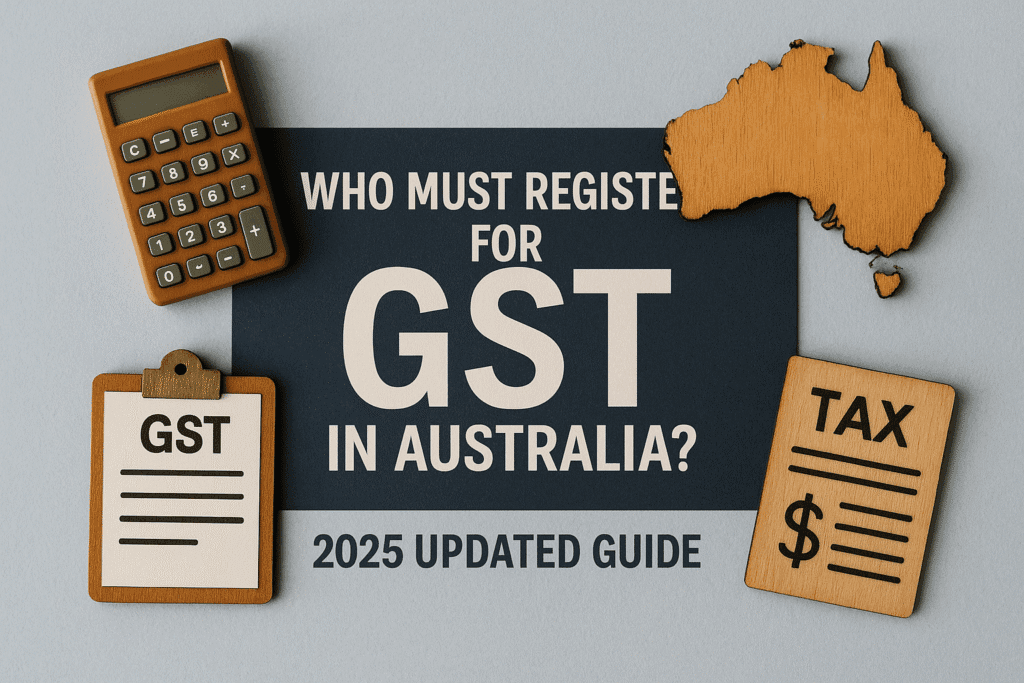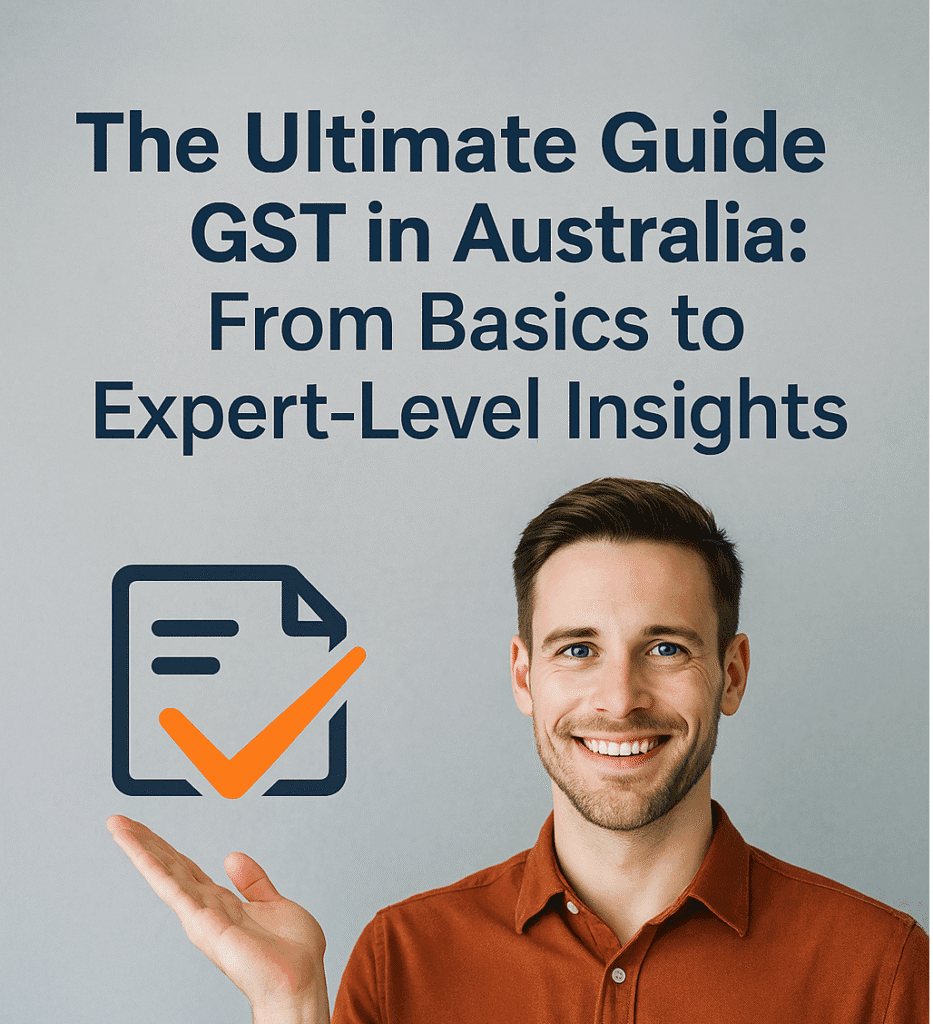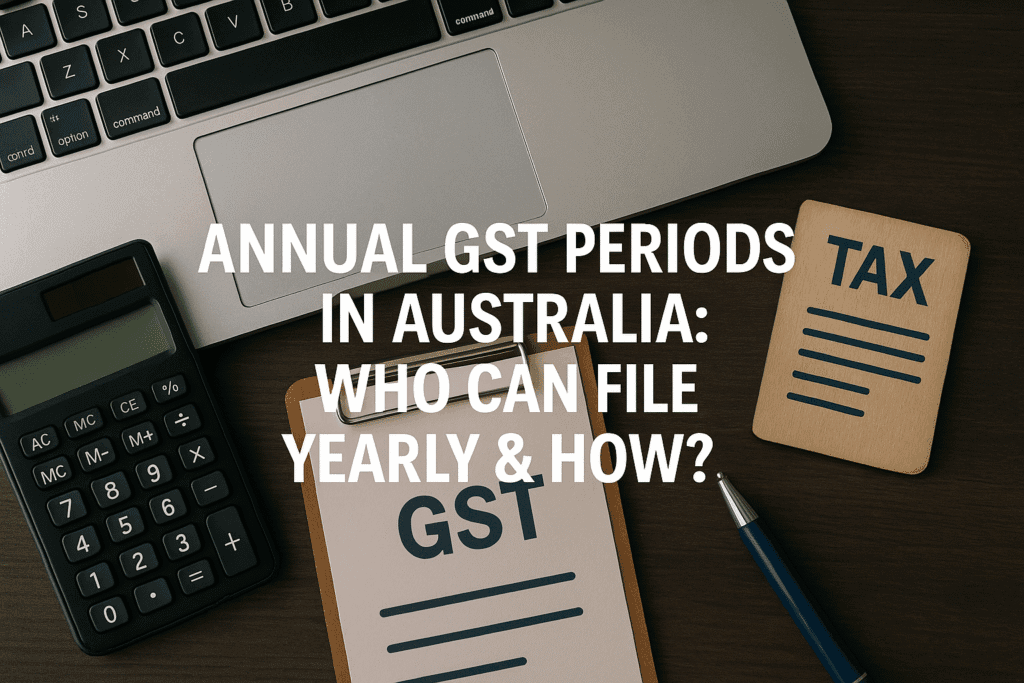Focus: Division 144, Division 146, GST Turnover Rules, Mandatory Registration, Limited Registration, Threshold Calculation
Introduction
If you are doing business in Australia—whether as a taxi driver, online seller, consultant, or foreign service provider—it’s crucial to know when GST registration becomes mandatory.
This guide explains who must register for GST in Australia under:
- General turnover threshold rules
- Special rules for taxi/ride-sourcing (Division 144)
- Rules for non-residents or limited-function entities (Division 146)
1. General Rule – Turnover Threshold: $75,000
Who needs to register?
If you are carrying on an enterprise in Australia and your GST turnover is $75,000 or more, you must register.
What is GST turnover?
Your GST turnover is your gross business income, excluding:
- GST you’ve charged
- Sales that aren’t taxable (e.g. exports, input-taxed supplies)
- Sale of business assets
How to calculate GST turnover?
It’s based on your current and projected turnover over 12 months.
Calculation Method:
- Add up the total value of taxable and GST-free sales you’ve made in the past 11 months, and add expected sales in the next 1 month.
- Or use projected turnover: Add current month + next 11 months.
If total exceeds $75,000 — you must register for GST within 21 days.
Don’t Include:
- GST collected
- Private sales or personal income
- Input-taxed sales (like residential rent, financial services)
2. Division 144 – Taxi Travel & Ride-Sourcing: Compulsory GST Registration
Rule:
If you supply taxi travel or ride-sourcing services in Australia, you must register for GST regardless of turnover (even if you earn just $500/year).
Covered under Division 144 of the GST Act
Examples:
- Uber, Ola, DiDi drivers
- Traditional taxi and limousine drivers (if fare-based)
- Rides booked via apps or offline
Responsibilities:
- Register for GST before starting operations
- Charge 10% GST on fares
- Provide tax invoices upon request
- Lodge BAS (Business Activity Statements)
3. Division 146 – Limited Registration for Non-Residents
Who is this for?
Non-resident businesses that supply goods/services to Australia and are not carrying on a business in Australia.
Common examples:
- SaaS platforms
- Digital product providers (ebooks, subscriptions)
- Foreign e-commerce platforms delivering to Australia
Key Features of Division 146:
- GST registration is required if you make taxable supplies to Australian consumers, even from overseas.
- You can apply for Limited GST registration.
Benefits of Limited Registration:
- You only collect and remit GST.
- No need to claim input tax credits.
- No ABN required.
- Simple quarterly lodgment.
Conditions:
- Must not carry on business in Australia
- Must only make supplies to private consumers (not GST-registered businesses)
Real Example:
A U.S.-based software company sells digital subscriptions to individuals in Sydney. They must register under Division 146 to collect GST—but cannot claim GST on their own costs.
Summary Table: Who Must Register for GST?
| Entity Type | Turnover Limit | Registration Required? | GST Credit Allowed? |
|---|---|---|---|
| Local business (Australia) | $75,000 | Yes (if threshold met) | Yes |
| Non-Profit Org | $150,000 | Yes (if threshold met) | Yes |
| Taxi/Uber Driver | $0 | Yes (always) | Yes |
| Foreign Seller (Digital) | $0 | Yes (if selling to AU) | No (Limited reg) |
4. When You Must Register Immediately
You must register:
- Within 21 days of your GST turnover exceeding the threshold.
- Before you start providing ride-sourcing/taxi services.
- As a foreign digital seller, when taxable supplies to AU begin.
5. Voluntary GST Registration
Even if you’re below $75,000 threshold, you can register voluntarily, especially if:
- You want to claim input tax credits
- You’re dealing with other businesses (B2B)
- You plan to grow soon
6. How XpertKeeping Helps You Stay Compliant
We help:
- Local & foreign businesses register under the correct category
- Taxi drivers, Uber drivers register and manage GST returns
- SaaS & e-commerce sellers comply with Division 146
- File accurate BAS & avoid ATO penalties
Need help with GST registration in Australia?
Book a free consultation today — Let XpertKeeping handle it for you.
FAQs
Q1: I’m earning only $50,000 freelancing. Should I register for GST?
A: No, unless you’re providing ride-sourcing or want to register voluntarily.
Q2: I’m a non-resident e-commerce seller. Do I need a local office to register?
A: No. You can register under limited registration without a local presence.
Q3: Can I claim input tax credits under limited registration?
A: No. Limited registrants cannot claim input tax credits.
Q4: Is GST registration different from getting an ABN?
A: Yes. GST registration is a separate process. ABN is needed for full registration, not for limited.




Thank you for your sharing. I am worried that I lack creative ideas. It is your article that makes me full of hope. Thank you. But, I have a question, can you help me?
I don’t think the title of your article matches the content lol. Just kidding, mainly because I had some doubts after reading the article. https://accounts.binance.info/ph/register-person?ref=IU36GZC4